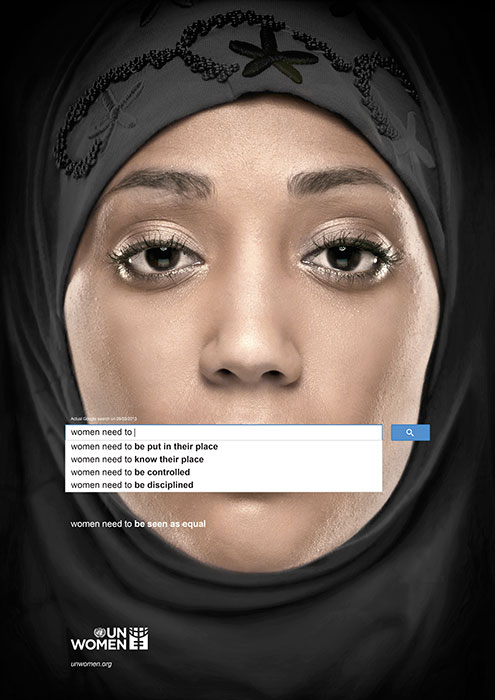The United Nations Women launched a new advertisement campaign that sheds light on sexist attitudes and gender inequality that exist around the world using a unique approach.
The campaign uses pictures of women from different countries and ethnic backgrounds with a Google search bar strategically placed over their mouths with different searches which include: “women cannot”, “women should”, “women need to” and “women shouldn’t.” Google ended those statements with auto completed results which included: “women shouldn’t have rights”, “women cannot speak in church”, “women should be slaves” and “women need to be put in their place”.
These were real search results that the United Nations Women and the international public relations agency Memac Ogilvy & Mather Dubai used from March 9, 2013 for the campaign. On the UN Women website, Christopher Hunt, art director of the creative team, explained,“When we came across these searches, we were shocked by how negative they were and decided we had to do something with them.”
One of the main reasons the ads are so effective and powerful is because of the placement of the Google search bar over the women’s mouths; representing the attempt to silence women’s voices around the world.
“The ads are shocking because they show just how far we still have to go to achieve gender equality. They are a wake-up call, and we hope that the message will travel far,” said copy writer, Kareem Shuhaibar.
After reading about the campaign I was curious to see for myself. So I opened up a search page and went to Google. I started to type in “women should” and the four first results to pop up were:
- Women should not be in combat
- Women should not preach
- Women should not speak in church
- Women should be seen and not heard
I sat and stared at my screen because I had proof right in front of me that people are searching for these horrible, degrading things.. Not one of the ad campaign searches that I tried to replicate came up with positive search results–not one. To top it off, they were not even slightly positive, they were inherently sexist and discriminatory.
Also accompanied with the ad campaign series is a Twitter campaign encouraging people to use #womenshould to give voice to those who want to speak out against gender discrimination and sexist inequalities.
So naturally after reading about this Twitter hash tag, I went on Twitter and searched #womenshould. The results were surprisingly positive compared to the Google searches. Some of the Tweets that included #womenshould in them included: “women should empower one another”, “women should hold more positions of authority”, and “women should be paid the same as men for the same work.”
Even though that gave me a little bit of hope, it did not offset the images from the search results used in the campaign or even the ones I Googled. I cannot fully understand how in the twenty-first century sexist and discriminatory things can dominate and literally outnumber the amount of positive things being said and searched about women. In a world where we are only seeing the number of women who hold political positions increase. A world in which more and more rights are being given to women every day. A world in which women have been climbing corporate ladders and are holding top business leadership positions. Yet, it does not appear to be enough to put an end to negative sentiments about women. This campaign is a constant reminder that despite how far we thought females have come, there is still so much more they have to do in order to receive equality.
Women should continue being proactive about changing these negative statements and searches. Because women can achieve gender equality by chipping away at the glass ceiling. And women need to take a stand and speak out against sexism and discrimination. Because women cannot live another day being subservient to men.
 Lisa Crocco is a senior public relations and political science double major at Illinois State University. Despite her hectic schedule of blogging, interning, and compulsive list-making, she find time to nap, read, and quote Gilmore Girls habitually.
Lisa Crocco is a senior public relations and political science double major at Illinois State University. Despite her hectic schedule of blogging, interning, and compulsive list-making, she find time to nap, read, and quote Gilmore Girls habitually.
Need a guest contributing writer for your blog or website? Have questions or comments that you would like to share? Reach out to her!

